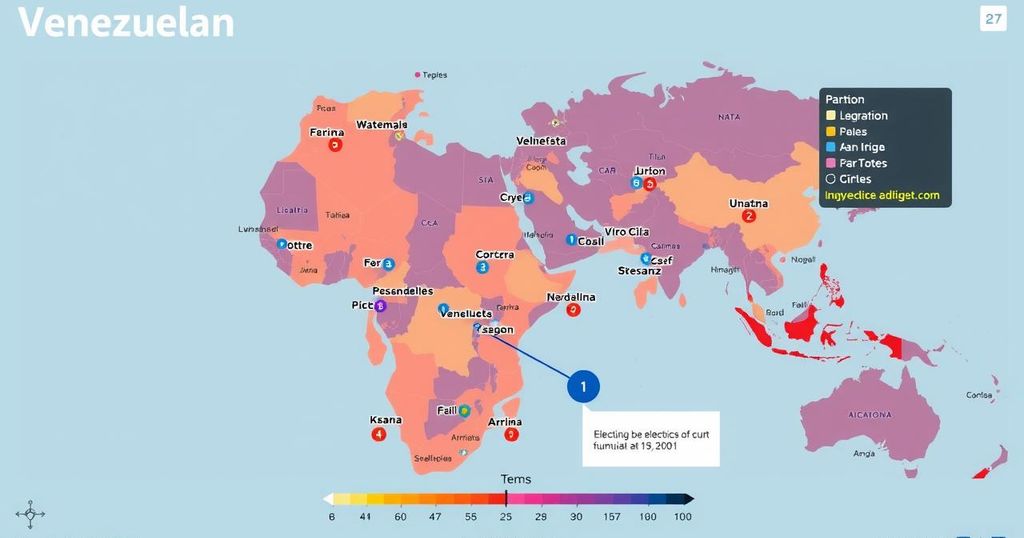Politics
ANTONY J. BLINKEN, CHAVISTA, CUBA, DEMOCRACY, DEMOCRATIC UNITARY PLATFORM, ELECTION, ELECTIONS, GONZÁLEZ URRUTIA, MACHADO, MARIA CORINA MACHADO, NATIONAL ELECTORAL COUNCIL, NORTH AMERICA, OF MASSACHUSETTS, OPPOSITION, POLITICS, PRESIDENTIAL ELECTION, SOUTH AMERICA, U. S, UNITED STATES, UNIVERSITY, UNIVERSITY OF MASSACHUSETTS, VENEZUELA
Leila Ramsay
0 Comments
Controversy Surrounds the 2024 Venezuelan Presidential Election Results
In the aftermath of the 2024 Venezuelan presidential elections, both Nicolás Maduro and Edmundo González Urrutia claimed victory, leading to widespread allegations of electoral fraud. The National Electoral Council (CNE) supported Maduro’s claim, while opposition groups contended González Urrutia won by a significant margin. The U.S. formally recognized González Urrutia as the president-elect, amidst international calls for transparency. The scenario is further complicated by Maduro’s assertion of winning and plans for an inauguration amid ongoing investigations into electoral integrity.
On July 29, 2024, both Nicolás Maduro and opposition candidate Edmundo González Urrutia claimed victory in the Venezuelan presidential election held the previous day. The National Electoral Council (CNE) supported Maduro’s assertion, eliciting accusations from the opposition and the international community of fraud amid a lack of substantiating evidence. Political analysts, including University of Massachusetts professor MJ Peterson, characterize this situation as the continuation of Maduro’s efforts to maintain power.
During the election, millions of Venezuelans hoped for a shift away from the current Chavista-led government. The government had previously barred prominent opposition leader María Corina Machado from candidacy due to her support for U.S. sanctions, resulting in support being shifted to her surrogate, González Urrutia. His nomination received backing from various opposition parties.
Despite CNE reporting Maduro secured 51 percent of the votes and González Urrutia 44 percent, accusations of electoral irregularities persisted. The Democratic Unitary Platform (PUD) contended these results and published data suggesting González Urrutia had won by a significant margin, approximately 30 percent more than Maduro. In response, U.S. Secretary of State Antony Blinken criticized the CNE’s quick declaration of Maduro as the victor as lacking credibility, officially recognizing González Urrutia as the president-elect.
Following the election, Maduro’s administration issued an arrest warrant for González Urrutia on to allegations of document forgery and conspiracy, forcing him into exile in Spain. In a statement on social media, he expressed feeling coerced into signing an acknowledgment of Maduro’s victory to ensure his safety.
As of October 16, 2024, Maduro announced his inauguration plans for a third presidential term, affirming his intent to adhere to constitutional protocols. He has initiated preparations for the ceremony, including inviting select foreign dignitaries, despite critiques from international observers, including Brazilian President Luiz Inácio Lula da Silva. Analysts emphasize that Maduro’s unyielding stance amidst foreign discontent indicates a firm grip on power.
The feasibility of a transition of power now hinges on the military’s allegiance, suggested by political analysts as a crucial factor against Maduro’s continued rule. The United Nations is set to investigate allegations of electoral misconduct, reflecting unresolved tensions surrounding the election outcomes. The next presidential inauguration in Venezuela is slated for January 10, 2025, as the political landscape continues to evolve amid external and internal pressures.
The 2024 Venezuelan presidential election unfolded against a backdrop of controversy, opposition suppression, and allegations of electoral malpractice. Nicolás Maduro, having been in power for years, faced significant challenges from the opposition, particularly following the disqualification of María Corina Machado, a prominent opposition figure. The election results have been marred by claims of fraud and lack of transparency, particularly concerning the National Electoral Council’s (CNE) role. The international response has included divergent perspectives, with nations polarized between recognizing Maduro’s presidency and supporting González Urrutia as the legitimate winner.
In conclusion, the controversy surrounding the 2024 Venezuelan elections highlights deep-rooted political tensions and questions regarding electoral integrity. With numerous allegations of fraud, divergent claims of victory, and international scrutiny, the future of governance in Venezuela remains uncertain. The military’s stance, coupled with ongoing investigations into the electoral process, could potentially alter the trajectory of power in the country. As the next inauguration approaches, the hearts and minds of Venezuelans will play a pivotal role in determining the nation’s future landscape.
Original Source: dailycollegian.com




Post Comment